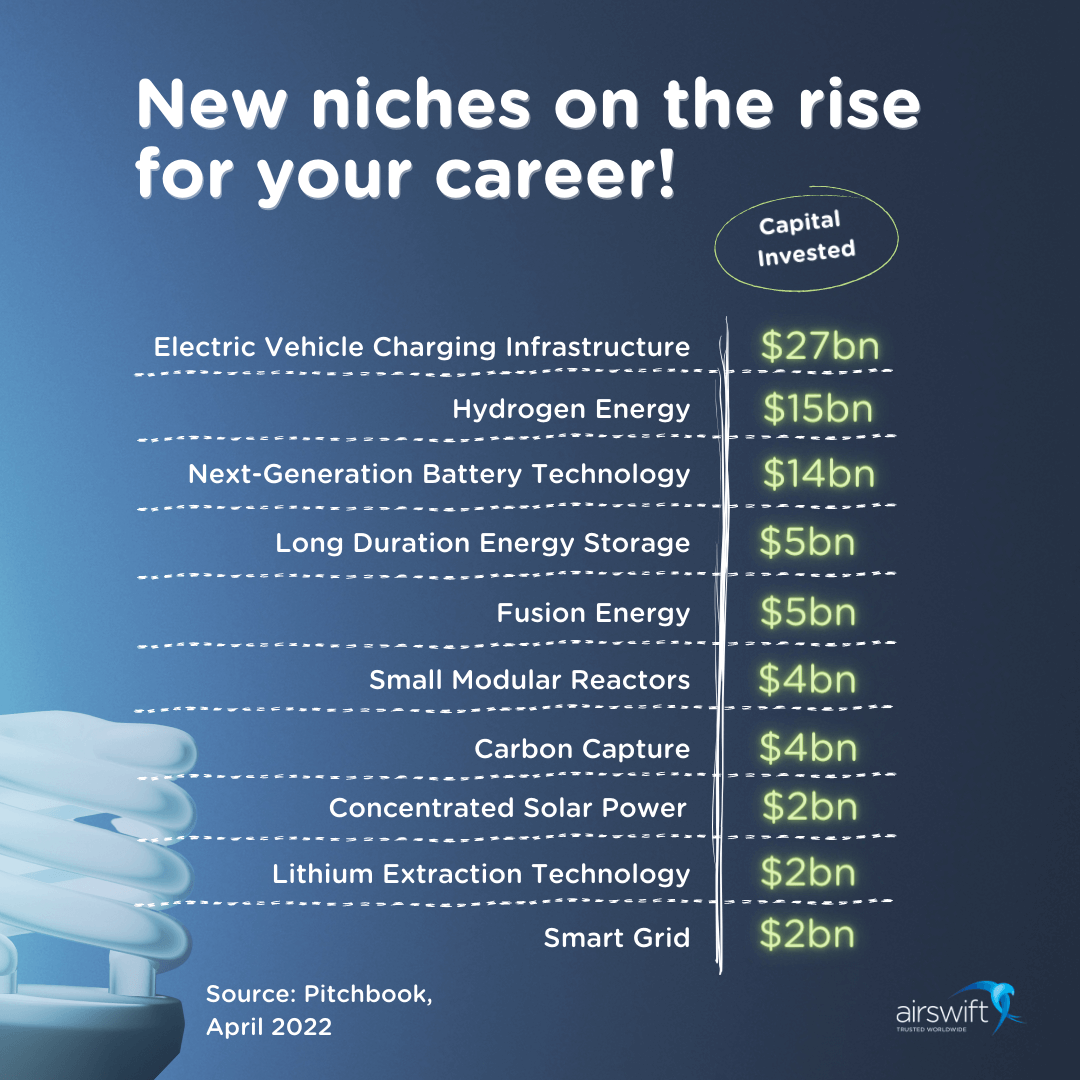Yes, power generation is a good career path. It offers stability, growth opportunities, and competitive salaries.
Power generation plays a crucial role in modern society. Professionals in this field ensure that homes, businesses, and industries have reliable electricity. The demand for power generation experts is consistently high, driven by the need for sustainable energy sources. Careers in this sector include roles in renewable energy, nuclear power, and fossil fuels.
Training and education in engineering or technical disciplines are essential for success. The industry also offers a range of specializations, from plant operations to energy distribution. Overall, a career in power generation provides a dynamic and rewarding environment with numerous opportunities for advancement.

Credit: www.airswift.com
Introduction To Power Generation
Power generation is a vital industry in the modern world. It ensures a steady supply of electricity for homes, businesses, and industries. This section will delve into the basics of power generation and its significance in our daily lives.
Overview Of The Industry
The power generation industry encompasses all activities involved in producing electricity. It includes various sources such as fossil fuels, nuclear power, and renewable energy. Each method has its own benefits and challenges.
Here’s a look at the primary sources of power generation:
- Fossil Fuels: Coal, natural gas, and oil are common sources.
- Nuclear Power: Uses nuclear reactions to produce energy.
- Renewable Energy: Includes solar, wind, hydro, and geothermal.
The industry employs millions of people worldwide. It offers various career paths, from engineering to maintenance and administration. The demand for skilled professionals continues to grow as the world seeks more sustainable energy solutions.
Importance In Modern Society
Power generation is crucial for the functioning of modern society. It provides the electricity needed for daily activities and supports economic growth.
Here are some key points highlighting its importance:
- Residential Use: Powers homes, ensuring comfort and convenience.
- Commercial Use: Enables businesses to operate efficiently.
- Industrial Use: Supports manufacturing and production processes.
- Technological Advancements: Facilitates the development and use of new technologies.
Without reliable power generation, many aspects of modern life would be disrupted. The industry is essential for maintaining the stability and progress of societies worldwide.
Career Opportunities
Exploring career opportunities in power generation can be exciting. This field offers diverse roles and emerging job markets. Let’s delve into the various career paths available.
Types Of Roles
Power generation offers many job roles. Here are some key positions:
- Electrical Engineers: Design and maintain power systems.
- Mechanical Engineers: Focus on the machinery in power plants.
- Technicians: Handle daily operations and repairs.
- Project Managers: Oversee projects from start to finish.
- Environmental Scientists: Ensure energy production is eco-friendly.
Emerging Job Markets
New technologies create emerging job markets in power generation. These include:
- Renewable Energy Specialists: Focus on solar, wind, and hydro power.
- Smart Grid Analysts: Develop and manage smart grid systems.
- Energy Storage Experts: Work on battery and storage solutions.
- Cybersecurity Professionals: Protect power systems from cyber threats.
- Data Scientists: Analyze data to improve efficiency.
These roles are crucial as the energy sector evolves.
Educational Requirements
Pursuing a career in power generation can be rewarding. The educational requirements vary depending on the role. Understanding these requirements helps you plan your education and career path effectively.
Degrees And Certifications
Most power generation roles require a degree. A Bachelor’s degree in Electrical Engineering or Mechanical Engineering is common. Some positions may accept an associate degree. Advanced roles might need a Master’s degree or Ph.D.
| Degree | Field of Study |
|---|---|
| Bachelor’s | Electrical Engineering, Mechanical Engineering |
| Master’s | Power Systems, Energy Engineering |
| Ph.D. | Advanced Power Generation, Renewable Energy |
Certifications also play a vital role. Professional Engineer (PE) license is highly regarded. Additionally, certifications like Certified Energy Manager (CEM) can boost your credentials.
Specialized Training Programs
Specialized training programs are essential. These programs provide hands-on experience. Many companies offer internships or apprenticeships. These opportunities help you gain practical knowledge.
- Internships
- Apprenticeships
- On-the-job training
Many institutions offer specialized training courses. These courses cover topics such as:
- Power Plant Operations
- Renewable Energy Technologies
- Grid Management
These programs help you stay updated with industry trends. They also make you more competitive in the job market.
Skills Needed
Power generation is a promising career path. It requires a unique set of skills. This field combines technical knowledge with essential soft skills. Below are the critical skills needed.
Technical Expertise
Technical skills are vital in power generation. These skills ensure smooth operations and safety. Here’s a list of key technical skills:
- Electrical Engineering: Understand electrical systems and circuits.
- Mechanical Engineering: Know how machinery works and how to fix it.
- Computer Skills: Use software to monitor and control systems.
- Problem-Solving: Identify and fix issues quickly.
- Safety Protocols: Follow strict safety rules to prevent accidents.
Soft Skills
Soft skills are equally important. They help you work well with others and manage tasks efficiently. Here are some essential soft skills:
- Communication: Explain technical details clearly to team members.
- Teamwork: Collaborate effectively with colleagues.
- Time Management: Prioritize tasks to meet deadlines.
- Adaptability: Adjust to new technologies and methods quickly.
- Attention to Detail: Ensure all work is accurate and precise.
Advantages Of A Career In Power Generation
Choosing a career in power generation can be rewarding. This field offers many benefits. Below are some key advantages.
Job Stability
Job stability is a major advantage in power generation. Energy is always needed. The demand for power never stops. This ensures steady employment. Workers enjoy long-term positions. The industry is less affected by economic downturns.
The need for skilled workers remains high. Companies look for trained professionals. This creates a reliable job market. You can build a stable career.
Growth Potential
The growth potential in power generation is significant. There are many paths for advancement. You can start in an entry-level role. With training, you can move up.
Here are some growth opportunities:
- Becoming a supervisor
- Specializing in renewable energy
- Transitioning to management roles
- Gaining certifications and advanced training
New technologies also create opportunities. The industry is evolving. Workers can learn new skills. This keeps the job exciting and rewarding.
The table below highlights potential career paths:
| Entry-Level Position | Mid-Level Position | Advanced Position |
|---|---|---|
| Technician | Supervisor | Plant Manager |
| Operator | Specialist | Director of Operations |
Power generation offers a promising future. Investing in this career path can be beneficial.
Challenges In The Field
The power generation sector offers numerous opportunities for career growth. However, it also presents several challenges. These challenges can affect day-to-day operations and long-term career satisfaction. Let’s explore some of these challenges.
Work Environment
The work environment in power generation can be demanding. Employees often work in various settings, such as:
- Outdoor sites with extreme weather conditions
- Indoor control rooms that require constant monitoring
- Remote locations far from urban areas
These environments can be physically and mentally taxing. Workers need to adapt quickly and stay alert at all times.
Safety Concerns
Safety is a major concern in the power generation field. Employees work with high-voltage equipment and hazardous materials. This increases the risk of accidents and injuries.
To ensure safety, companies enforce strict safety protocols. Workers must wear protective gear and follow safety guidelines. Regular training sessions help keep safety practices up to date.
Despite these measures, the inherent risks remain. Employees must stay vigilant to avoid accidents.
| Challenge | Impact |
|---|---|
| Work Environment | Physically and mentally taxing |
| Safety Concerns | Risk of accidents and injuries |
In summary, the challenges in the power generation field are significant. They require a high level of dedication and vigilance. Understanding these challenges is crucial for anyone considering this career path.
Future Trends
Exploring the future trends in power generation can highlight the industry’s potential. This sector is evolving rapidly with advancements in technology and a shift towards renewable energy. These trends can make power generation an exciting and promising career path.
Renewable Energy
Renewable energy is becoming a major focus in power generation. Solar, wind, and hydropower are growing quickly. These energy sources are sustainable and environment-friendly.
Governments worldwide are investing in renewable energy projects. This creates many job opportunities. People with skills in renewable energy will be in high demand.
Below is a table showing the growth of different renewable energy sources:
| Energy Source | Growth Rate | Job Opportunities |
|---|---|---|
| Solar | 25% per year | High |
| Wind | 15% per year | Medium |
| Hydropower | 5% per year | Low |
Technological Innovations
Technological innovations are transforming power generation. Smart grids and energy storage systems are improving efficiency.
Artificial Intelligence (AI) is being used to predict energy demand. This helps in better management of resources.
Here are some key technological innovations in power generation:
- Smart Grids: Improve energy distribution and reduce outages.
- Energy Storage Systems: Store surplus energy for later use.
- Artificial Intelligence: Optimize energy production and consumption.
People skilled in these technologies will find many career opportunities. These trends indicate a bright future for the power generation industry.

Credit: www.engineeringclicks.com

Credit: www.zippia.com
Frequently Asked Questions
What Skills Are Needed In Power Generation?
Technical knowledge, problem-solving skills, and safety awareness are crucial for success in power generation careers.
Is Power Generation A Stable Career?
Yes, power generation offers stability due to the constant demand for electricity and energy.
How Much Do Power Generation Jobs Pay?
Salaries vary, but many positions offer competitive wages and benefits, often exceeding national averages.
What Education Is Required For Power Generation?
Typically, a degree in engineering, technology, or a related field is needed for most power generation roles.
Are There Growth Opportunities In Power Generation?
Yes, the industry offers numerous opportunities for career advancement and specialization.
What Are The Working Conditions In Power Generation?
Work environments can be industrial and may require shift work, but safety protocols are strictly followed.
Conclusion
Choosing a career in power generation offers stability and growth. The industry promises innovation and sustainability. Skilled professionals are always in demand. This path provides a rewarding and impactful career. Consider power generation for a fulfilling future. It’s a smart choice for those passionate about energy solutions.
